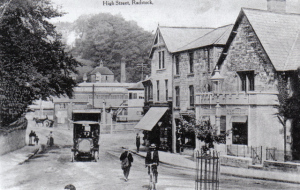George Gregory (b. 1888): Home and Family
A very large portion of the first part of George Gregory’s autobiography – the part I earlier labelled as the memoir section – is concerned with or involving home or family. It is clear that both of these had a huge influence in George’s life and he has very distinct memories of people, locations, and events in his earlier life. George talks about this himself in the opening lines of his work:
I suppose it is difficult to forget the house in which one was born in for it becomes a part of life, and always remains a place in the background of what is done in later life; and because of that, it is important where a child is born, and the factors that are most active there (1)

His later descriptions of his house and the surrounding village, remembered within the context of late 20th century life, tell us that he doesn’t believe his childhood was ideal. I think it demonstrates George’s intelligence that he can look past the ever-present rose-tint of nostalgia and analyse the facts of his past honestly. George mentions problems with his living space, ‘it was a very poor place indeed, lacking many things that are… vitally needed for the growth and development of a child’ (1), and his parents, ‘I might have had a better start if my parents had been more equipped for their task, for both of them were illiterate’ (2). Despite this, George never speaks hatefully about his parents, and I don’t believe he condemns them in any way in his writing – rather he is just aware of their shortcomings.
Some parts of his memories of home are much more positive than those I’ve already mentioned. George often gets carried away with anecdotes about his antics as a child in his home town and there is a definite sense of fondness present in the writing. For example, George writes about how he and his friends stole oranges from a neighbour’s tree and how they felt like ‘men who had found diamonds in a stream’ (9). Most of the positive anecdotes are separate from memories of his parents and relate more to times with friends, in and around the village, suggesting that the children of that era were left to their own devices, for the most part.
Because of the detailed, factual style George writes in, People > Ideas is a very useful source of historical information. Specifics from a lot of the short memories George recounts can be extrapolated to present a picture of family life in general in the early 20th century. He mentions, very calmly, at one point that his sister ‘died of consumption’ (4) which displays how common and destructive tuberculosis was in the period. We also get a fair insight into the different roles of men and women in relationships as he writes about his parents’ lives before children. He says, about the house he lived in as a child, ‘[it was] built originally to house men who worked at the coal mine, and their families’ (1), the implication being that the family followed the man to wherever he could find work.

However, George’s retelling of his parent’s entry to the world of property ownership offers a contrasting view to this standard. He explains how, whilst the two were on their way to buy furniture for their family house, his father told her he had no money and ‘the contents of her purse must decide what they bought’ (4). This reversal of the expected gender roles really highlight to me that family life is not, and has never been, as black and white as the stereotypes suggest.
I think it is important to note that George does not write anything about home or family in his adult life. All emotional description of his past is confined to his childhood and young adult years. In an article published in Social History, David Vincent claims that ‘the most striking characteristic of the autobiographer’s treatment of their family experience is not what is said but rather what is not said’ (226). Perhaps George’s reticence about these details of his later life indicates that he never felt as strongly about them as he did in childhood, or maybe there is something else at play giving him a reason not to mention home or family. Unfortunately we will only ever be able to theorise about why George left out this information.
Researching and writing this post has helped me to understand George more completely and get an insight into what turned him into the adult he became, but it has also given me a new perspective on the past itself. Although a lot of things have changed since George’s childhood, there is so much that is the same.
Gregory, George, ‘Untitled’, Burnett Archive of Working Class Autobiography, University of Brunel Library, Special Collection, 1:283.
Vincent, David. ‘Love and Death and the Nineteenth-Century Working Class’. Social History 5.2 (May 1980): 223-247.

Leave a Reply